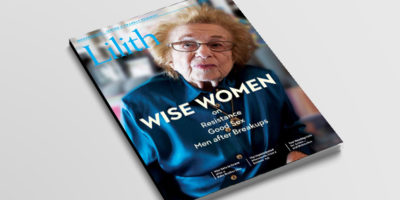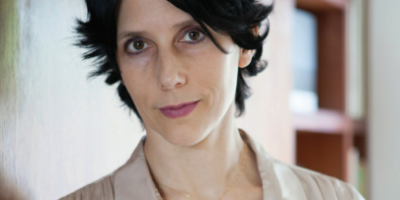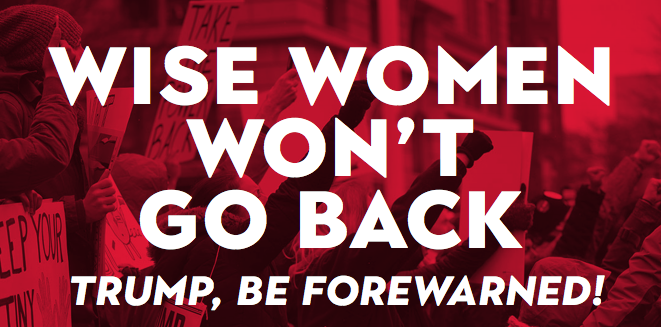
SPECIAL SECTION: Wise Women Won’t Go Back
Trump, Be Forewarned!
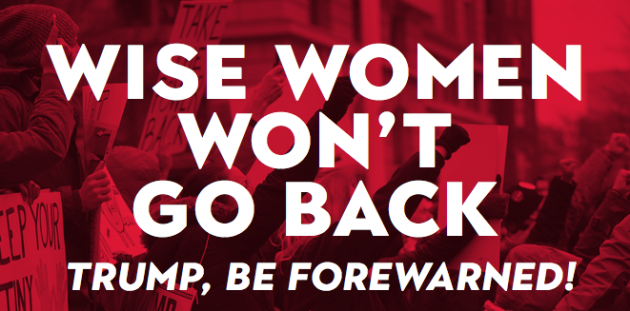 After the Women’s Marches following the Trump inauguration, Lilith asked 12 battle-wise feminists: What now? Among their answers: support responsible media, stay civil, follow your passion, keep dancing, prepare for the long haul, find allies in unexpected places—and organize like crazy!
After the Women’s Marches following the Trump inauguration, Lilith asked 12 battle-wise feminists: What now? Among their answers: support responsible media, stay civil, follow your passion, keep dancing, prepare for the long haul, find allies in unexpected places—and organize like crazy!
Paula Doress-Waters has been part of the Our Bodies, Ourselves collective since its start in 1970. She co- authored the know-thyself guide to women’s health and reproductive systems that freed women from the male monopoly on medical knowledge. By 1973, the book was a bestseller. Doress-Worters co-authored Ourselves and Our Children (1978) and was senior editor of The New Ourselves Growing Older: Women Aging With Knowledge and Power (1987, 1994). The Library of Congress declared Our Bodies, Ourselves one of 88 books that shaped America. The collective keeps evolving, changing its emphasis to women’s reproductive justice, working with global partners. Following Trump’s election, Doress-Worters organized Our Bodies, Ourselves contingents in the Washington and Boston Women’s Marches.
“All the things we advocated for in the ‘70s and ‘80s are up for grabs,” Doress-Worters says. “Even pre-Trump, we had Our Bodies Our Votes campaign. When Rep. Todd Akin (R-MO) justified his opposition to abortion even in the case of rape, saying, ‘If it’s a legitimate rape, the female body has ways to try to shut that whole thing down’, we crowd-sourced funding to give copies of Our Bodies, Ourselves to every member of Congress.”
From decades of experience in collective action, Doress-Worters says, “We learned a lot working together with groups of friends, with consciousness-raising groups. It’s particularly important in the current situation with an administration hostile to reproductive rights and LGBT rights.”
With belief that “information inspires action”—the motto of the Our Bodies, Ourselves website—she says, “We have to contact representatives across the aisle.” Her daughter, Hannah Doress, is an environmental and political activist. “Her idea is to have a group of people with different skills, different bases of knowledge. You need people to go to demonstrations with, people to remind you of what’s coming up in Congress.”
As a resident scholar at Brandeis-Women’s Studies Research Center, she wrote Mistress of Herself: The Life and Work of Ernestine L. Rose. “I wanted to learn more about how 19th-century women managed to get all those things accomplished without the vote. They had to be persuasive, persistent. They got it done, but at great cost.” Now, as an affiliated scholar at the WSRC, she’s writing of her own life in social movements.
The daughter of Jewish immigrants from Poland, Doress-Worters says, “Many of the values of Our Bodies, Ourselves are human-rights values from the Torah and Ethics of the Fathers—and the mothers, too. They forgot to mention them.”
***
Liz Lerman received a MacArthur “genius grant” Fellowship in 2002 for work as a choreographer, educator and author. Dance Exchange, the intergenerational performance company she started in 1976 and led until 2011, has created “non-fiction dance,” working with shipbuilders, physicists, clergy and the military. Lerman, with fellow artists, developed the Critical Response Process, now a book she co-authored, Critical Response Process: getting useful feedback on anything you make, from dance to dessert. She is also author of Hiking the Horizontal: Field Notes from a Choreographer (2011). A professor at Arizona State University, Tempe, her laboratory focuses on artistic tools and creative research. Her advice on the A.S.U. website: “Turn discomfort to inquiry.”
“Participate, participate, participate,” is Lerman’s response to the Trump administration’s assaults on America. “One reason the women’s marches were so amazing was that we were on our feet, physical, together and singing. Making art together, being together helps us sustain this level of feeling.”
Lerman sees “dance as a way to activate people for many purposes including whatever the organizing action is. It’s a way to give people an internal sense of empowerment, doing something all together.” She says, “It also reminds us of beauty, of working towards something outside of ourselves but needing each one of us to make it work.”
Lerman, who speaks of “my restless relationship to Judaism,” says, “Movement stuff—that’s what I do in my synagogue (Temple Micah in Washington, D.C.). It’s been my lab for doing participatory creative actions for 20 years. What’s beautiful in that setting is that the action can be individual and communal, it can be internal and external. It can allow one to find a new relationship to ancient stories, texts, as well as to the events of today.”
The day after the election, her students at A.S.U. were weeping. Families feared being split by deportation. Lerman says, “How do you protect people? Do you have circles of us circling people’s homes?” One possibility: “You can teach different ways of being through dancing. The act of figuring out how you would teach what to do if they come for you puts you in a different frame of mind. If you let people in on creation, people sort things out. There’s a lot of divergent thinking. There’s a lot of convergent thinking. It brings people together.”
***
Heather Booth has been organizing since 1960, in the civil rights movement and during Freedom Summer, 1964. As a college student, she went south to Mississippi with the Student Non-Violent Coordinating Committee (SNCC) to work with local African Americans on voter registration. Back at the University of Chicago, Booth started what became the JANE Underground, a collective that helped more than 10,000 women get safe abortions when abortion was illegal. A few years later she was part of the founding of the Chicago Women’s Liberation Union. She went on to union and political organizing, all captured in Lilly Rivlin’s new documentary “Heather Booth: Changing the World.”
Booth sees the Women’s March as a powerful example of an action that created a moment of intense resistance, an opportunity for making change. She sees the next step as long-term organizing— “listening to people to find out their concerns and ways to respond to them. Finding out where people’s passions lie whatever the issue: defending health care, stopping the giveaway of public land…the privatization of public schools… rapacious oil drilling.”
Justice, justice: “As Jews, we lead with our values of history, tradition, faith and texts. In the face of injustice, you struggle for justice.” Her favorite words in the Yom Kippur service are Isaiah’s call to action—“Breaking the bonds of wicked power and letting the oppressed go free.” She says, “And we are now facing wicked power.”
Her strategy: “We can work together for the same cause even if our specific priorities are different.We need to look for activities that allow us to come together. We need to tie the issues into elections and tie elections into issues.”
Her advice on avoiding burnout: “One way is to have areas of life that give you joy—it can be the work, family, friends, travel, walking, reading, dancing, music. And take care of yourself and those you care about. This is a marathon, not a sprint.”
Booth says, “The second element, at least as important and less often stated: Have a strategic plan and framework for the actions you’re taking. You need to have a sense of how they fit into greater change, so when something doesn’t work, you don’t say, ‘How could you?’ You say, ‘Thanks for trying what you did. How can we learn from this and move on?’”
Booth doesn’t candy-coat the future: “I think we’re entering a perilous period where there will be terrible threats and harm that will be done. Families will be ripped apart. People who’ve acted on their values to build a better world will be threatened, jailed, some may die in this struggle. But more people are involved working for social change than ever before in my lifetime. In actions every day, we see people’s thoughtfulness and caring across issues and constituencies, people’s dedication and purpose. It’s a perilous time, but it’s also inspiring.”
***
Dorothy Zellner was a staff member of SNCC, 1962–1967, helping screen civil rights volunteers in 1964 and co-editing with Julian Bond the SNCC paper Student Voice. She co-edited Hands on the Freedom Plow: Personal Accounts by Women in SNCC and is a founding member of Jews Say No, a Jewish organization protesting the Israeli government’s treatment of Palestinians. At 79, she writes, lectures and protests. Zellner spoke to Lilith’s Malka Foundation Fellow, Amelia Dornbush.
Zellner has been “totally, totally impressed with the resistance.” She says it’s important to “appreciate the victories” large and small. In a climate that is likely to get more difficult, Zellner highlights learning stories of past resistance as a way to keep going. She singles out three.
The first is the 1936 Battle of Cable Street, London, where counter-protesters stopped the British Fascist Union from marching in the predominantly Jewish East End neighborhood, hastening the decline of British fascism. “They did something great,” says Zellner. Women, including Jewish women, protested and used mattresses to create homemade barricades. The more establishment Jewish community had discouraged the counter-protest and advocated quietism. This “would have had a desperate effect on all of us, especially those of us who were Jewish,” says Zellner. If British fascism had grown, Britain could have remained neutral during the war. Or worse.
The second is the history of “Colored Conventions”— meetings first held in the 1830s by free black activists planning a path towards liberation. Slavery had been in place for hundreds of years, yet the tiny abolitionist movement continued to organize. Zellner has been transcribing speeches from these conventions as part of a project hosted by the University of Delaware. “How do you keep going? How do you keep your community together? How do you protect each other? How do you raise the demands that you need to raise?” Zellner asks. “The conventions are a great, inspiring example.”
Zellner’s third example is Palestinian resistance. “Palestinians are winning because they are not leaving,” she says. “This is not only a question of marching, it is a question of getting up every day and living some kind of a life.” The simple act of surviving is a place from which to draw hope.
“The way forward is not going to be easy,” Zellner told this 24-year-old journalist. “But I’m reminded of the way I felt when I was your age.This is your time now. I’m excited for you because you can do it.”
***
Nancy Kaufman is C.E.O. of the National Council of Jewish Women, the 90,000-member organization founded in 1893, whose motto is “A faith in the future. A belief in action.” NCJW was one of the organizers of the January 21 Women’s March on Washington, with signs that read “Jewish women speak up.” Kaufman responded to Lilith by email from Ecuador.
“NCJW has plenty of experience to draw from in protecting our rights in the current era. Our members met the boats coming into Ellis Island to prevent women from being trafficked and sold into prostitution. We marched for the right to vote. We joined with United Negro Women to demonstrate in “Mississippi Moral Mondays” during the Civil Rights Movement. We defended a woman’s right to choose and we protected Roe v. Wade.
“The key: sign petitions, attend town halls, call senators. The Internet has given us more leverage. Now, when you write an op-ed for your local paper it can get picked up nationally and be spread in seconds. You can send your senator’s phone number to everyone you know with one click. When your congress people and local representatives will be in town, show up and make your concerns known.
“Books I find relevant are Hillbilly Ellegy by J.D. Vance and Just Mercy by Bryan Stevenson. It may also be time to reread Saul Alinsky’s Rules for Radicals for understanding the importance of local community organizing. I am always inspired by Margaret Mead: ‘Never doubt that a small group of thoughtful, committed citizens can change the world; indeed, it’s the only thing that ever has’.”
***
Gina Nahai grew up in Tehran under the Shah, then went on to live in the world’s largest contemporary Persian-Jewish community—Los Angeles. She’s an award-winning novelist, a columnist for the Jewish Journal of Greater Los Angeles and public speaker. Her novel Moonlight on the Avenue of Faith reviewed in Lilith 1999. Her latest novel, The Luminous Heart of Joseph S., is about an Iranian Jewish family struggling to find its identity in America.
Nahai keeps fighting the urge to give up struggling with the majority of L.A.’s Iranian Jews, staunch supporters of Trump. She finds it “intolerable not just how they vote but the pressure on everybody else in the community to fall into line. They were always on the political right—the more conservative the Republican the better. They adored George W. Bush. They supported the Tea Party. Now Trump is their hero. The Iranian Muslims and Jews who support Trump and want to kick out all the undocumented immigrants—80 percent of them were here illegally after the revolution. Eventually they got refugee status.”
She sees the shift toward greater conservatism starting a dozen years ago when L.A.’s young Iranian Jews began questioning, for the first time, the values of their conservative 3,000-year-old culture. In reaction, Iranian Jews embraced right-wing politics and Ashkenazi Orthodox Judaism.
Nahai asks, “What do you do as a woman to make people consider other possibilities? What do you do as an Iranian Jew? We’re too entrenched in our beliefs. There’s no changing anyone mind.”
The outspoken Nahai has endured many verbal assaults. “I feel I have a responsibility to present what I believe is true.” Once, when she wrote about LGBT rights and marriage equality, she says, “Iranian Jews started a petition to educate me—sort of a threatening thing.”
Nahai urges anyone who cares about accurate reporting to support The New York Times, the Washington Post and the (British) Guardian with a print subscription. Deeply concerned about freedom of speech, a former board member of PEN West, Nahai and her husband hold frequent fundraisers, with particular support for liberal candidates and Jewish and Israeli causes. They “devote time and money to supporting candidates that hold the various evil entities accountable, or at least stand up to them.”
***
Judy Chicago has been inventing feminist art since the 1970s. “The Dinner Party,” one of her monumental collaborative efforts, now on permanent display at the Brooklyn Museum, celebrates 39 women around a giant triangular table with personalized place settings and vulva-shaped ceramic dinner plates. Artist, writer, teacher, Chicago’s installations celebrate the power of women. “Through the Flower,” her non-profit feminist art organization, showcases art to counter the erasure of women’s achievements.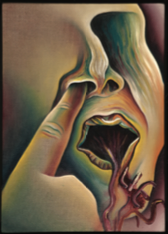
In Chicago’s own words: “In the 1980’s, I did a major project titled ‘PowerPlay’ that includes this painting. I just wish the pushback by patriarchy—as epitomized by Donald Trump—had not taken place. Instead of the progress we worked for, we’re having to re-invent the wheel, which is an unfortunate reality of women’s history. But we’re involved in a long, historic struggle and this is a particularly dark time. It seems important to realize that this is not about one man but, rather, a structural and institutional framework that needs to be overturned.”
***
Pepper Schwartz holds the dual portfolio of professor of sociology at the University of Washington, Seattle, and the AARP national love and relationship expert and ambassador. She writes AARP’s Naked Truth column and previously wrote Glamour’s Sex and Health column.
Schwartz says, “The most important thing we have done is to show a unified expression of disgust and dismay in fighting efforts to take us back to the dark ages. It’s also important to raise individual voices affirming women’s rights over our bodies.” For starters: “We need to write to local newspapers and websites whenever the topic comes up.”
Fighting the new Administration’s agenda, she says, “It’s very hard to have civil discourse with people who disagree with you but it’s important to keep trying.” She advises keeping responses personal: “This is how it makes me feel, and here’s why I’m worried.” That way people who disagree with you “don’t feel as if they’re being verbally disemboweled.” She advises, “Keep up with things in the news, things that other women would agree with you on even if they didn’t agree with your candidate.” She says, “I don’t know of anything easy, but it’s important to reach out to others of decent good will who might take another look at the situation.”
As for couples where one supports Trump,“I would advise them to stay away from that conversation. Couples’ relations aren’t simple. There’s always his- tory, inequities that people have worked very hard to overcome. That doesn’t mean it’s a bad marriage if there’s one subject you can’t talk about with each other. You’ve co-existed before.You’ve created a pact. Peace in the relationship is really important.”
Schwartz extends this concern to friends and family. “You have to be very careful. It won’t be helpful to tackle them in an aggressive way. The goal is to have both people’s feelings recognized and supported. Changing a person’s mind needs lots of ability to discuss things in a good way. Find written material that both sides can respect.” Schwartz says, “It’s in my blood as a Jew to care about the rights of everyone.”
***
Ruth Messinger, Democrat and former elected official, has gone from New York city council member to Manhattan borough president to president and C.E.O. of American Jewish World Service, the international development and human rights organization. When she stepped down after 18 years, she took on the title of AJWS global ambassador, working with Jewish and other faith leaders to speak out for global equity and justice, including programs to stop violence against women and LGBT people.
“Despair is not a strategy,” to quote Messinger, responding to the Trump presidency. “We don’t have the luxury to retreat. It’s time for action.”
She recently traveled to the Dominican Republic with U.S. rabbis to meet with local social justice advocates. They told the Americans,“We feel so sorry for you, but take courage. You can resist fascism.”
Messinger counsels: “Because we’ve suffered assaults as women and as Jews, we have to focus on the long haul. We have to attempt to stop the Administration from undoing the things we’ve won over the years and prevent them from doing far worse things.” In that bundle she puts reproductive health care for American women and for overseas women dependent on U.S. programs; LGBT rights here and worldwide; and the continuation of U.S. foreign aid.
Messinger sees an administration whose actions and words will “endanger a vast number of people in this country before they come for us as Jews.” But, she says, as Jews we know that to save one life is to save the world. The Jewish community can make common cause with other faith-based and secular organizations. We can start by watching, demonstrating, going to a march, calling congressional offices, engaging others in these critical efforts.
How to choose your issues? Messinger says: “I think every issue is a woman’s issue. There’s no single agenda. Over the next few months [this was in February], it will become clear which threats appear greatest, where the most people are damaged, what issues each of us cares most about to work on for the long haul; and what actions—like attacks on a free press—have repercussions that go way beyond the next four years.”
***
Rabbi Susan Talve is people’s “short-cut to integrity,” to quote St. Louis Magazine. Ordained in 1981, she became the founding rabbi of Central Reform Congregation, the only synagogue within St. Louis city limits. CRC welcomes LGBTQ families and Jews of color, is pro choice and has a long history of building relationships with African-American and Muslim congregations.
Rabbi Talve says, “It will be curious how much is a smoke screen for what Trump really cares about, putting his billionaires in charge. Women’s health care, reproductive choice, the environment are so incidental to Donald Trump and Ivanka’s brand. How could someone care that little about people’s lives? That for me is the key to the big pictures – remembering this is about individual lives.”
Talve’s take: “The good news is that we do have organizations that are doing the work. We don’t need to reinvent them. Planned Parenthood is a great example. We need to support them. We’re so used to public-private partnerships, we forget how much power we have as private citizens. We cannot let poor women, people without access to legal abortions go back to coat hangers.”
How to do this? “Marches, rallies and town halls show that people care enough to reach outside of our comfort zones and make connections with new allies. Ferguson taught us that the people have the will to stand together to do the work and demand the changes in the system that will address the legacy of racism. In February I was arrested in New York with 19 other rabbis protesting the ban on travel from seven predominantly Muslim countries, just days after I participated in a police training in St. Louis on fair and impartial policing. Keeping the pressure on the issues while doing the work will bring about change.”
As for Israel, where she wants security for Israel and justice for Palestinians: “In spite of Trump’s being surrounded by what looks like Jewish people, I don’t trust that they’d get our back.”
She’s been rereading Shulamith Firestone’s The Dialectic of Sex: The Case for Feminist Revolution. And last Mother’s Day, her two grown daughters gave her This Bridge Called My Back, writings by radical women of color, with Audre Lorde’s words: “The master’s tools will never dismantle the master’s house.”
In short: “The challenge for me as a rabbi is not to lose hope. We have to work with people we ordinarily do not work with. I’ve had so much advantage and privilege in my life, sometimes I have to be the back for those who are oppressed. Sometimes I have to hold the space, especially for women of color and transgender women of color. Sometimes I have to ask for help. The present administration has unleashed permission for anti-Semitism and hate. This is the time for Jews in America to make space for our allies to stand with us as we stand up to bullies and say no to any form of prejudice or hate.”
***
Blu Greenberg founding president of the Jewish Orthodox Feminist Alliance, has seen the organization grow in 20 years to 5,500 members. At this year’s JOFA conference — a month before the Orthodox Union once again barred women from the rabbinate — 1,200 participants from four continents heard from women who serve in leadership roles within Orthodoxy. Attendees cheered as Greenberg was presented with a book of essays in her honor. She was also a founder of Women of Faith, a Jewish-Christian- Muslim trialogue, and the Dialogue Project with Jewish and Palestinian women.
Speaking from Israel, Greenberg said, “I had hoped when Trump won the election, the stature of the office would have an impact upon him. But 50 days in, that seems not to be the case.
“What I worry about most under Trump’s watch: the environment—irreversible damage could leave a huge burden for our children; constant denigration of a free press; cutting humane social welfare programs; and women’s issues, less a rollback of past gains than the world’s leading democracy ignoring global women’s issues such as sex trafficking, child marriage, rape as a tool of war, and female poverty.
“We have to think strategically, have a long-term vision. We need to form broad coalitions to protect the dignity and freedoms of American political life. The results of pushback on immigration are a good sign of this process at work.
“Regarding my primary concern, Israel: so far, Trump seems to be oriented to protecting Israel’s survival in a hostile world. Nikki Haley at the U.N. is hopeful and David Friedman, ambassador to Israel, deserves a chance since all other policies have not worked. And having Jared Kushner and Ivanka in the court gives me comfort.”
Greenberg’s prognosis is hopeful: “I think democracy will reassert itself. There are plenty of Americans who voted for Trump who don’t want to see the end of democracy; we need to hear those voices and they ours, and work together. Moreover, women have a lot more power than we think. It can be harnessed for great good, even in this administration.
“If I play the situation against the struggles of Jewish feminism, I see hope. If a centuries-old traditional religion could make mid-course corrections, I have faith that a months-old administration can make mid-course corrections. But we’re all going to have to work really hard,” she says, to make sure that those mid-course corrections take place. “We can’t rest on someone else’s work.”
***
Evelyn Torton Beck wrote Nice Jewish Girls: A Lesbian Anthology (1982, 1989), the book that brought out of the closet anti-Semitism within the lesbian community and homophobia within the Jewish community, recognizing that one oppressed group could oppress another. At the University of Wisconsin and at Maryland, she pioneered
in women’s studies, Jewish women’s studies and lesbian studies. She was a founder of the National Women’s Studies Association and its lesbian and Jewish caucuses, as well as the National Lesbian Feminist Organization.
Beck was born in Vienna in 1933; the family arrived in America in 1940 on the last ship out of Italy. A traumatized and depressed child, she credits Hashomer Hatzair (the leftist Zionist youth organization) for saving her life with its hope and promise of building a new world in Israel where men and women would be equal. She credits her Sholom Aleichem Yiddish after-school with giving her a woman teacher and songs of hope.
Beck says: “When Trump first was coming forward, every- thing was starting to evoke memories, feelings of living under the Nazis. I used to believe it can’t happen here. But immigrants are being held, people with valid green cards are being taken away. We must remain positive and organize, be with each other not to feel isolated.”
Beck’s partner, L. Lee Knefelkamp, recommends reading Lest Innocent Blood Be Shed: The Story of the Village of Le Chambon and How Goodness Happened There, Philip P. Hallie’s history of the Huguenot village in rural France that hid thousands of Jews in clear sight of the Vichy government. And Beck recommends the 28-minute version of the documentary “Weapons of the Spirit,” based on the book, and the Indivisible Guide from the anti- Trump movement started by former congressional staffers, using the Tea Party playbook. She considers it “sane, concrete, something I can trust.”
At the Washington Women’s March with her children and grandchildren, Beck was “amazed by the warmth, the incredible kindness and peacefulness of the crowds.” Quoting one of the signs, “The Future Is Female,” she says, “At this moment in history I think women should take the lead, but men should be included.”
At the same time, “It’s important for us also to be healing, taking care of ourselves.” Beck’s a believer in the immediate sense of community that comes with the ancient steps of sacred circle dancing, which she teaches at Temple Micah in Washington, D.C. In the 1980s, Beck was on the political side of a spiritual/political divide that splintered second-wave feminism. Now she says “spirituality has definitely come to the fore. Dancing is part of the connections with all humans across boundaries in a very deep way.”
For moral and spiritual support, she says, “I often recite—and do a wonderful dance to—Im Eyn Ani Li, Mi Li? If I am not for myself, who will be? If I am only for myself, what am I? And if not now, when?” Then she adds the line Adrienne Rich appended: “And if not with others, how?”
Amy Stone is a founding mother of Lilith, now a contributing editor and a Lilith blogger.

